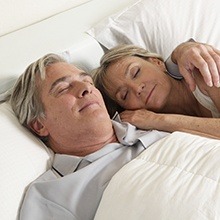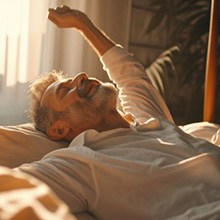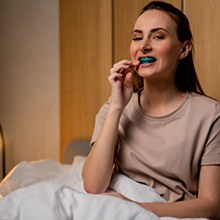

There are very few things that are as irritating and disheartening as a bad night’s sleep. While you sleep, your body is able to refresh and restore itself to prepare for the day ahead. Your mind and muscles are able to relax, and your body will be ready to perform anything to your fullest potential. When your sleep is disturbed, even in the slightest, it can drastically alter how your body feels and acts. Sleep apnea is no easy condition to live with, and Dr. Stephanie Santos and Dr. Vinita Folck are focused on making sure our patients are taken care of in many different areas. Beyond giving people a beautiful smile, they can also help those struggling with sleep apnea overcome the disorder using a solution custom-made for them.

The most common form of sleep apnea is OSA, or obstructive sleep apnea. The word “apnea” literally means “without breath,” so when you sleep, your body’s breathing becomes interrupted for up to 10 seconds. Because this pause can happen several times in a single night, your body is left feeling more tired than when you went to bed.
If you suffer from OSA, when you sleep, the soft palate in your mouth relaxes and collapses, causing your airway to become partially or fully blocked. This may cause you to snore excessively and loudly, have short breaths, or stop breathing altogether.

One of the ways our dentists can help our patients with sleep apnea is by providing oral appliances. One of the appliances they may recommend is the TAP®, or Thornton Adjustable Positioner. This appliance caters to those who suffer from OSA and is able to keep the airway open so air can flow easily while someone sleep. It works by positioning the lower jaw forward and prevents the tissue of the soft palate from collapsing, allowing a patient to get better sleep and subside any snoring.
The TAP® consists of upper and lower trays that fit over the teeth and are adjustable to provide optimum comfort. The TAP® 3 TL allows a patient to open and close their mouth and has more room for the tongue to move freely. Either way, this is a great device to help patients get a better night’s sleep.
Another appliance that may be recommended is the Silent Nite® SL. Just like the TAP®, the Silent Nite® SL works by positioning your jaw forward, allowing for air to flow easily. For this appliance, however, certain registrations must be taken to ensure optimum results. A patient’s bite registration is taken into account, ensuring that their Silent Nite® SL is custom-made to fit their own unique bite.
The EMA®, or Elastic Mandibular Advancement, also helps with OSA and is very non-invasive. Like the previously mentioned appliances, EMA® positions the jaw forward for better airflow, but it also opens the bite. It is designed for optimal patient comfort, as it comes with five different strap lengths and four elastic tension options. The EMA® can work for patients that have a full or partial set of teeth.

There’s no reason for you to struggle with sleep apnea anymore. Dr. Santos and Dr. Folck can help you get the sleep you’ve been wanting at our Virginia Beach dental practice. Call us today and make your appointment to start enjoying restful nights again.

The cost of sleep apnea treatment can depend on a few different factors, so we cannot provide any specific pricing information until you come to visit our team for a consultation. Once we have designed your custom treatment plan, we can help you understand the financial aspect of your care. We will also be happy to help you file claims with your medical insurance company and apply for low-interest financing through CareCredit if necessary.

Dental insurance is designed to help you pay for the cost of services that directly benefit the teeth and gums. Since sleep apnea is an overall health condition, you should not expect your dental insurance to help pay for your care. Rather, treatment for sleep apnea is typically covered by medical insurance instead.

The two biggest factors that affect the cost of sleep apnea treatment are:

Some patients are somewhat reluctant to pay for sleep apnea treatment. Granted, it might seem a bit on the pricey side. However, it can actually help you save a lot of money in the long run by protecting your overall health.
For example, sleep apnea is associated with a heightened risk of heart attack, stroke, diabetes, dementia, and other serious conditions. By improving the quality of your sleep, you might be able to delay or prevent the onset of these conditions, thus preserving your quality of life and reducing your overall medical expenses.
Sleep apnea treatment may also reduce your risk of being involved in an expensive and painful car accident.

Beyond medical insurance, there is another provision that could make it easier to afford your oral appliance therapy: financing. Our practice is proud to partner with CareCredit, a third-party lender that provides low-interest payment plans for qualified patients. The application process is easy, and our team will be happy to walk you through it.
At first, the connection between dentistry and sleep apnea may not be clear, but your dentist is an expert in the upper respiratory area. With obstructive sleep apnea, tissues from the mouth and neck can prevent healthy breathing, and dentists can reposition the lower jaw to keep those tissues out of the airway. Also, you already meet with your dentist regularly, so you have a built-in appointment where you can be examined and ask additional questions.
An apnea event lasts for 10 seconds or longer. They can last for up to two minutes. These episodes can occur anywhere from 5 to 30 times each hour of sleep. A sleep test will reveal how advanced your case is, how often episodes occur, and what type of sleep apnea you have. 0-15 apnea events per hour are considered mild while 30 times or more are severe.
This is possible. Being overweight is a major risk factor for obstructive sleep apnea, as excess weight and tissue can block the airway. Losing weight could reduce that tissue. However, there is still a chance that you could continue to have sleep apnea even after you lose excess weight. You would need to complete another sleep test to determine whether you are still suffering from the condition.
To avoid cavities, gum disease, and other infections, it’s important to keep your oral appliances clean. In the morning, right after taking out your appliance, you should gently brush it and rinse it off. When you aren’t wearing your appliance, you should always keep it in its case. You can also use a denture cleanser to keep it fresh.
Yes. Approximately 1-8% of children suffer from sleep apnea, but their symptoms differ from those of adults. Symptoms can include bed-wetting, sleep terrors, attention or learning problems, inability to focus, and hyperactivity. The same process needs to be followed for children as adults.